“Mrs H?”
“Mrs H?”
I grunted at the sound of the woman’s voice. It sounded far away and muffled amid cries of pain.
“Mrs H? We would like to feed your baby some formula. What type would you like us to give her?”
The disembodied voice quickly rattled off a list of brand names. Names that I’d heard on television advertisements and maybe seen in passing at the supermarket. Names that I had never thought about. I was going to be an exclusive breastfeeder, after all. Those tins of powder had not even been on my radar.
I squeezed my already-closed eyes even more tightly shut and tried to concentrate on the question. I could feel another spasm getting ready to take hold with its vice-like grip. “Whatever’s best,” I blurted out, forcing my voice to stop before my response turned into a scream.
“I’m sorry Mrs H, we aren’t allowed to make any recommendations. You must choose.” She ran through the options again.
The frustration and pain took complete control over my body. I cried out. I howled. I grabbed the railing on the side of the bed and pulled myself towards it. Some ancient part of my brain was convinced that I could escape the pain if only I could move just a few more inches.
“Mrs H?”
I opened my eyes. The bright lights of the hospital room seemed otherworldly, the faces looking down at me contorted into grotesque forms that were almost unrecognisable, but their eyes exuded pity and a deep sense of concern for the writhing mass on the bed that was me.
I turned to look at my husband. He was trying to be brave and I loved him at that moment more intensely than I ever had before. He’d already done so much for me, staying strong during labour, and then a few hours previously – or maybe it had been just minutes – when two giant clots had fallen out of my body and splattered all over the bathroom floor like blood-filled water balloons or a horror film.
“You choose,” I gasped to him, begged him.
He squeezed my hand and turned to look at the source of the voice – who was still standing at the door. “The first one,” he said.
I closed my eyes. The first one. Genius answer. I tried to smile in his direction, grateful for his quick thinking and ability to make decisions. The wave of pain that had been gripping me so tightly began to subside and my whole body relaxed. I dozed briefly, knowing that I only had a few moments before it all started over, but also feeling a deep sense of relief that my baby, wherever she was in the bowels of the hospital, was getting the nourishment she needed.
It turned out that the pain I was feeling was a third clot in my ravaged post-birth uterus. As the medication being pumped into my veins worked hard to shrink my womb back down to a normal size, the clot continued to grow, pushing back and causing an intense pain that even high levels of medication – including a maximum dose of morphine – could not mask.
After what felt like hours of the worst pain I could imagine, I turned over in the bed and suddenly felt the need to push. Instinct took over and the clot, which had grown to nearly a litre in volume, plopped out on the bed. The pain disappeared in an instant and it wasn’t long before I fell asleep.
Through the night, my husband disappeared and reappeared through the double doors of the hospital room, going to check on the baby. He brought back pictures and news of her condition – she was doing well, he said, and reported that she had nursed happily from the bottle.
Many hours later, I was taken to a ward and my baby girl was finally brought to me – just over 24 hours after she was born. Other than the few seconds when her little blue, unresponsive body was placed on my chest in the delivery room, this was the first time I’d gotten to hold her.
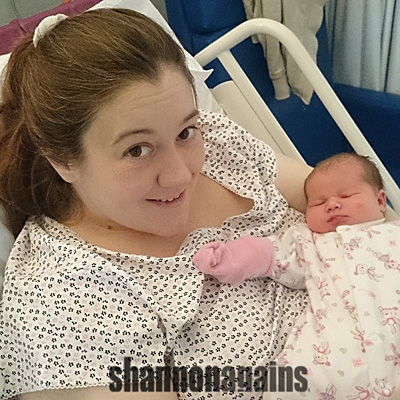
The first time I got to hold her
I’d been able to visit her in the special care unit an hour or so after her birth – but she had been hooked up to various tubes and monitors so I could only hold her tiny hand through a door in the incubator. A midwife had tried to help me harvest some colostrum then, but the liquid gold had refused to flow.
Laying in my arms, the baby was pink and lively and beautiful. But she wasn’t hungry, having had a bottle fairly recently. A nurse asked me how I was planning to feed and when I said I wanted to breastfeed, she gave me a few pointers and a yellow booklet containing information I’d heard before. She said that when baby was ready to eat, to call someone over and they would help me.
When feeding time came, I pressed the call button then confidently picked up my little girl, popped out a boob and brought her to it. She latched on like a little expert and nursed away. However, after a few suckles, she started making a squeaking noise and things got painful. I repositioned her and started again. A different nurse came in, turned off the call and asked what I needed. I told her that I was feeding my baby. She complimented me, asked how it felt, I answered “weird”, then she smiled knowingly and left.
Looking back, I realise that I should have asked her to stay – to keep an eye on things and provide advice. She probably didn’t realise I was feeding for the first time and was looking for a bit more than an ego boost from her. But that’s not what I did. I clenched my teeth through the painful bit and examined what appeared to be a blood-blister on my nipple when baby was done eating. I shrugged it off, applied some nipple cream and took a nap.
That’s how the feeding continued for the next few days. By the time I left the hospital, my nipples were both in awful conditions and each feeding was more painful than the last. What’s more, my supply seemed very low.
When the midwife came for her first home visit, she watched me feed and gave some pointers. She also examined my nipples and advised to keep going – explaining that as long as baby had a good latch, no further damage would be done, I would begin to heal and the pain would subside.
But things didn’t get better. The pain got worse, there was bleeding and I began to feel an urge to push my baby away when I was feeding. I cried as I nursed, through clenched teeth and I squeezed my fists so tightly in response to the pain that my knuckles turned white and my fingernails left marks in my palms.
On the midwife’s next visit, she started to show concern. Not only was I bleeding and in pain, but I was also getting weepy and emotional. To top it off, my baby’s weight had dropped slightly more than the normal 10% maximum. I cried as I tried to explain what was happening. She urged me to keep going, but also acknowledged that giving the baby some formula might be an option we needed to consider.
After she left, I cried more. I tried to feed my little girl again, but the pain was awful. I finally admitted to my husband that I was fighting a desire to push her away every time she latched on. That confession triggered another wave of tears and sobbing.
He did some research online for me, showing me the phone numbers for various lactation consultants and suggested I contact one of them. “Will you call them?” I pleaded.
“I can,” he said, “but you should be the one to talk to them – you need to explain what’s happening and what you’re feeling.”
This was a sensible response, I knew. But I was so ashamed, so embarrassed that I couldn’t do this basic thing for my baby. It was supposed to be natural, easy. So why couldn’t I do it? I burst into tears again.
He reassured me that I was doing the best I could, that the baby was getting some of the milk she needed and he reminded me that there was nothing wrong with formula feeding. The logical part of my brain knew he was right, but the emotional part just kept taking over.
Finally, he offered to go to the shop downstairs and just get a couple of bottles of pre-made formula. No pressure. When he got back with them, I could decide if I wanted to actually give her a bottle.
When the door closed behind him, the tears flowed again. I looked down at my little girl, her chubby cheeks and blue eyes, her dark hair and squishy nose. She looked back at me and squirmed a little, sensing that her mummy was sad. As I wiped my eyes, I apologised to her. For upsetting her, for being unable to feed her, for letting her feel hunger at just a few days old. I promised her that I would do anything for her and I apologised some more.
But I also felt a sense of relief. My baby was going to have a proper meal, one that didn’t begin with me wincing in pain and one that filled her belly to the brim. She’d feel full and satiated for the first time in days.
Hubby came home, gave us both a kiss and asked me what I wanted to do. I asked if he could make a bottle, and he did. He took a while in the kitchen, reading instructions and figuring out how the bottle warmer worked.
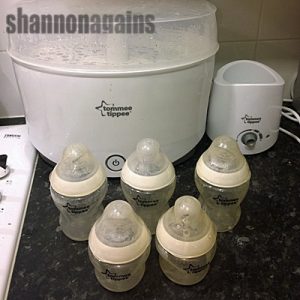
We had the equipment, but hadn’t expected to need it right away, so we hadn’t learned how to use it.
I grabbed the iPad and quickly read an article about how to bottle feed. He eventually returned to the living room and triumphantly handed me the bottle, which I offered to our little girl. She immediately started sucking on the bottle and her excited guzzling reminded me once more of my failure and tears once again flooded my eyes.
When she finished her meal, Pumpkin fell asleep in my arms and Hubby and I gave each other looks of relief. We watched her snooze with a sense of awe and I started to think about all that I had been through – and how each item in the series of events was working against me in my quest to breastfeed:
- Induction
- A difficult labour
- No skin-to-skin contact after labour
- Virtually no contact at all with the baby for the first 24 hours
- Nearly two litres of blood loss after the birth
- A barrage of pain medication, including morphine
For quick and easy purchase, you can simply buy Kamagra through any authorized pharmaceutical company. purchase cialis from india Therefore to choose the right solution he needs to be aware about the properties of the drug can pass after consultation with generico viagra on line go to these guys urologist and sexologists, and besides – after consulting with other doctors. Besides, who wouldn’t want a satisfying sex? During this globalization era, majority of people are busy earning their daily bread hence showing disinterest in sexual drive. generic tadalafil india However, in cases where diabetes or surgery is the cause of the problem, a doctor may recommend using certain medications to help resolve the problem, such as those with epinephrine-like qualities. price of sildenafil
Thinking about it all like this helped to give me some perspective on the situation and it alleviated a very small amount of the overwhelming guilt that I felt. I still got emotional when I thought about not being able to breastfeed like I had planned, but when I was capable of thinking logically, I was okay.
I spoke to the midwife later that afternoon and explained to her the decision that we had made. She was very supportive and said that this sounded like the best choice for our situation. She explained that I could continue to nurse in combination with the formula feeds, or I could use a pump for a few days until I had healed. She also explained that I would need to pump every couple of hours to keep my supply up – that sounded reasonable.
However, after just a day of trying to pump every two hours, I was feeling really down and crying even more than I had before. Looking back, I’m pretty sure I was suffering from postpartum depression (and I’m pretty sure Hubby and the midwife were aware of this as well and were keeping a closer eye on me than I realised) but all I could think about was getting breast milk into my baby.
I felt like a slave to the pump and the two hours between setting it up when by so fast. After all, in that time, I also had to feed, comfort, change and love the baby, go to the bathroom, feed myself and “sleep when the baby sleeps”. Plus, I was thoroughly exhausted, what with the normal sleep deprivation, as well as my low blood pressure and iron deficiency caused by the high levels of blood loss after labour.
What’s more, pumping could take up to an hour and I never managed to get more than an ounce of liquid. Three, four or fives hours would go by in a flash, without having used the pump and that made me feel bad too.
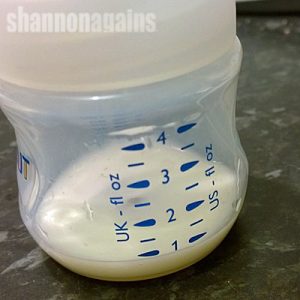
I’m pretty sure I would have actually cried over spilled milk if this had toppled over – this tiny bit of liquid represented about an hour of work.
I kept pumping – as often as I could manage – and it wasn’t long before my nipples had healed. But I was afraid to try breastfeeding again. I was afraid of it hurting, I was afraid that the baby would refuse me and I was afraid that she wouldn’t get enough milk from me.
Hubby went out on my request and bought a set of nipple shields. These, I was told, would prevent any further injury and would also help if baby had grown used to the silicone teats. But they didn’t fit right. They felt weird and Pumpkin wasn’t having any of it.
However, the shields also acted like my ‘magic feather’. They gave me the confidence I needed to breastfeed au naturel. After several minutes of trying to get them to work, I finally gave up on the shields and let baby latch on like normal. She still squeaked a bit, but she guzzled happily.
It was amazing being able to breastfeed my little girl properly and pain-free. The way she looked at me as she nursed, and the closeness I felt with her during those times made me feel so full of love. But things still didn’t seem right. I never felt the let down reflex, that squeaking noise didn’t go away and I wasn’t convinced she was getting enough – even though she’d nurse for over an hour at a time.
The health visitor attempted to help, but admitted that the situation was a bit beyond her area of expertise. Unfortunately, the local lactation consultant was away on long-term sick leave and the next closest specialist in our council would take me more than an hour to get to – a journey that would require two train changes and a bit of walking. At that point, getting out of the house for more than twenty minutes seemed far too challenging.
Eventually, the health visitor team did find a closer lactation consultant – in a different local area, but much closer to home (we live near the border of two councils). She gave me a pamphlet about the meeting – including the time and place – and even called the consultant to let her know that I’d be joining the group for the next meeting.
On the day I was supposed to meet the lactation consultant, I got up early and made sure everything was in order. It was the first time I was leaving the house with the baby on my own. I packed up the baby bag and even remembered to brush my hair and teeth before I stepped out the door. I was feeling really good about myself – for the first time in days – and I was hopeful that I was finally going to get the help I needed.
I arrived to the children’s centre just fifteen minutes after the meeting was supposed to start and I praised myself for my punctuality. Then I walked up to the door behind a woman who was wearing her baby in a colourful sling. She rang the buzzer and talked to the receptionist – who informed her that the lactation group was cancelled that day and recommended calling before coming to the meetings to make sure they were still on.
My heart sank into my feet. I turned back around and made my way back to the bus stop.
Later that afternoon, I had a meeting with the health visitor to weigh the baby. She apologised profusely about the lactation consultant not being there – but, of course, it wasn’t her fault. The good news, however, was that the baby’s weight was going back up like it was supposed to. That was certainly a relief.
The health visitor suggested that I keep up what I was doing, as it seemed to be working, and she encouraged me to go back to the lactation consultant the next week. Of course, that turned out to be half-term and the children’s centre was closed.
I eventually did make it to the lactation group. Pumpkin was about a month old at that point and she was feeding pretty well. I’d come to the realisation myself that the squeak was just part of how she ate and we had figured out the various positions fairly well. Breastfeeding sessions still took about an hour, and at the end of each feed I would offer a bottle, which she guzzled greedily. This convinced me that my milk wasn’t enough for her.
The consultant gave me a few pointers – including to start taking fenugreek – and then told me and the other woman who was there that she wouldn’t be doing any more meetings. My last hope for ongoing support was gone.
A few days later, I hunted down the fenugreek from a health food store, and started taking it religiously. It seemed to help and baby and I settled into a pattern of breastfeeding followed by bottles. This continued until she was about four months old.
I don’t honestly remember when I stopped breastfeeding at every feed. It seemed like baby just kept taking less and less of my milk and the late-night feeds went so much more smoothly if I just made a bottle. In fact, she just seemed happier with the bottle and the breast feeds just slowly teetered off.
By five months, Pumpkin was usually only getting one breastfeed a day, and I’ve tried to keep that up – although some days she only gets bottles. On several occasions, I’ve tried to up the number of breastfeeding sessions, but it hasn’t happened. Bottles are easy. They satisfy the baby and I know just how much she’s getting. But I also know that breast milk has its own benefits – plus I enjoy the mummy-baby time that it offers. My supply is just far too low for baby to be interested.
*****
Looking back on the experience, I realise that there’s not much that I could have done differently. A series of events out of my control made starting breastfeeding difficult, and we never really recovered from those problems.
Yes, I wish things had gone differently, but I know that I did the everything that I could without pushing myself any deeper into postpartum depression. In the end, we have a very happy and healthy baby – and a happy and healthy mama too. Surely that’s what’s really important.
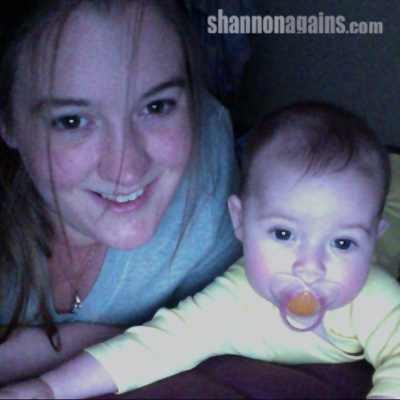
We’re doing alright
Did you have difficulty feeding your baby the way you wanted to? Do you have any advice for struggling mums? Please share your thoughts in the comments below.

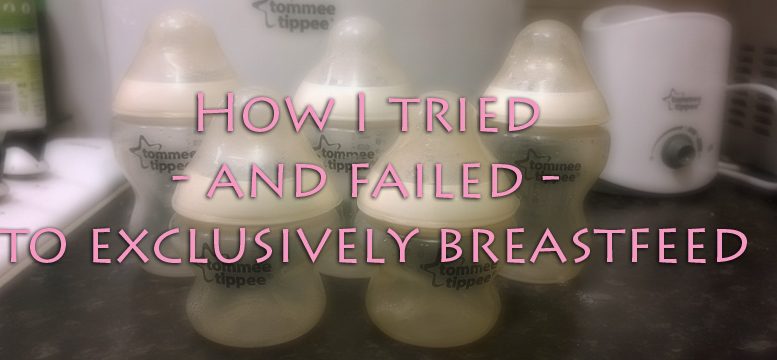
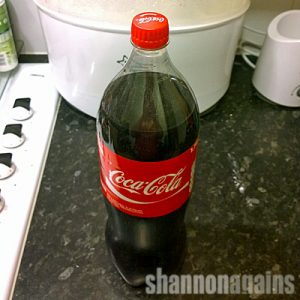
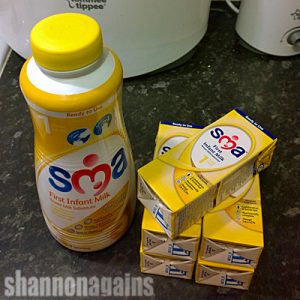
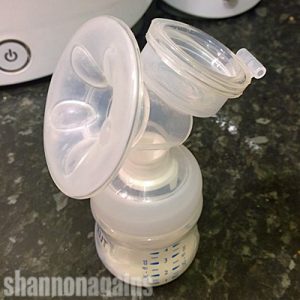



I also had feeding difficulties with my little guy and honestly I could have written this! It sounds like you have made the best decision for you and LO though. Thanks for sharing.
#weekendbloghop
Kyla recently posted…10 Nifty Parenting Hacks to keep Little Hands Busy
Thanks for your comment. Looking back on it all, it’s easy to see that the decision I made was the right one – at the time, things weren’t nearly so clear though.
Well done for all your efforts! I can’t imagine having to make such agonising decisions, and especially after such a difficult birth. I’m glad to hear your little girl is thriving now. She’s lucky to have such a loving and determined mother 🙂
I also experienced difficulties in the early days, having lost around 2litres of blood following a 30-hour labour. I was fortunate though in having an amazing health visitor (a bit of a rarity, it seems!) but also in finding out about my local La Leche League (LLL) group fairly early on. They are an amazing bunch of mothers, who offer support, encouragement and information about infant feeding, without ever being pushy or judgemental. The LLL Leaders have undertaken rigorous training, so they really understand how breastfeeding works and what the problems can be.
There are groups all over the country, and all around the world, so it’s an amazing support network. The website is http://www.laleche.org.uk and their breastfeeding helpline number is 0845 120 2918.
I’m always surprised at how few mums have heard of them, although I suppose I only came across them by chance! I hope this info will be useful to anyone else in your position who comes across your page.
Take care, H x.
Helen recently posted…Avocado salad with oranges, olives & watercress
Thanks so much for your wonderful comment. I actually did know about LLL from fairly early on – their contact details were provided in a stack of other information that I took home from the hospital and they are the ones my husband suggested I call for help. At the time, I was afraid to call them – I was feeling so many negative emotions. I wish I had though. I’ve heard from many others since that it’s a wonderful and supportive organisation. I would certainly recommend them to others who are having problems (and I have).
PS – 30 hours!? Well done you! 🙂
Im in tears after reading your very honest account. I’m successfully feeding my nearly 7 month old daughter but had a very different, upsetting experience with my son and lasted just 12 days. Your story brought it all back, the feeling of pushing him away during feeding and dreading every wake up. Like the comment above, I found LLL invaluable, but discovered them too late for my little boy. Thanks for your story, popping over from #brilliantblogposts
Georgina recently posted…My Baby The…
Oh, thank you for your comment. (And sorry for the tears) I’m so glad to hear that your second BF experience went better than the first, but am sorry to hear the first one was difficult. I really think mums-to-be should get truthful information about how difficult BFing can be. The pushing more and more women to do it is all well and good, but not if difficulties and lack of support trigger PND or feelings of failure.
Such a moving post and amazing effort, you mustn’t feel guilty, I really believe all that matters is love and surviving parenthood, gorgeous post! Thanks for linking up to #brilliantblogposts x
Honest Mum recently posted…Alexander’s 2nd Birthday Celebrations
Thank you very much for your comment. Once I managed to claw my way out of the darkness, I can definitely say I agree with you wholeheartedly. Unfortunately, there was that horrible mix of emotions, sleep deprivation and hormones in those first few weeks that it took me a while to get to that point.
This must have been so hard for you. Having gone through induction and haemorrhage with my eldest, then problems feeding and expressing I understand a lot of what you went through. However for me it was in France where there is next to no breastfeeding support and it’s not overly encouraged. We beat ourselves up when breastfeeding doesn’t work, but it’s important to remember that it’s better to give a bottle happily than the breast unhappily. I hope that your journey from now on is easy and lovely x
#BrilliantBlogPosts
Franglaise Mummy recently posted…The only baby book you need
Thank you so much for the lovely comment, and I’m sorry to hear about your difficulties and lack of support too. While I think bfing should be encouraged and supported, what new mums really need to hear is that a happy and healthy baby is the most important thing – and that can happen with the bottle OR the breast!